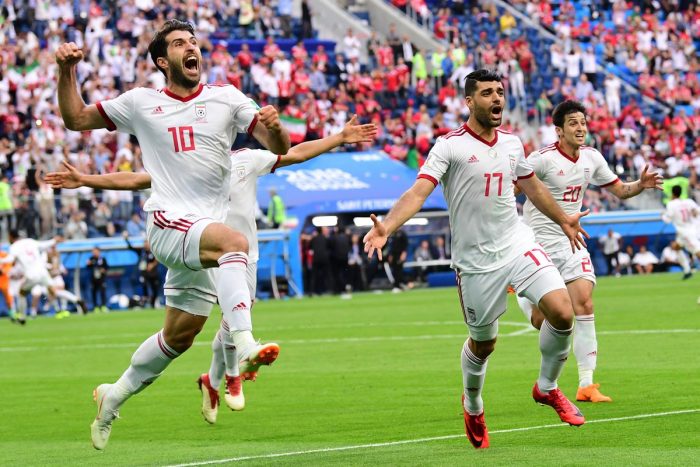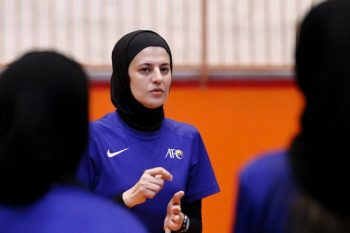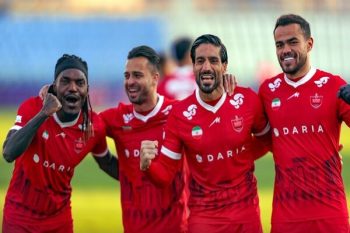Asian Cup: Expectations high for Iran but not all is rosy

DW – ABU DHABI, Six months after a strong performance from Iran’s national team at the World Cup, expectations for ‘Team Melli’ are high. At the upcoming Asian Cup, fans are hoping for a first title in 42 years.
At the 2018 World Cup in Russia, the Iranian national team set themselves new standards. The players produced largely convincing displays in the assumed “group of death,” which included European champions Portugal, former World Cup winners Spain, as well as Morocco. Their haul of four points from three games had a euphoric effect on a sport-loving society back home in Iran.
That success has brought with it increased expectations for “Team Melli,” as the side are known, with fans keen for a first piece of silverware since a run of three Asian Cup wins between 1968 and 1976.
Bookie’s favorites
Those high expectations are not without foundation and are backed up by the odds, with most international bookmakers listing Iran along with Japan as favorites to win the tournament. Defending champions Australia and South Korea are also highly fancied.
However, Iran coach Carlos Queiroz has attempted to dampen any talk of victory. “Reaching the semifinals of the 2019 Asian Cup is the dream of Iranian football,” the much-loved Portuguese coach said recently.
But the 65-year-old’s low-key approach was not universally appreciated, with many in the country expecting no less than the title, despite the fierce opposition they’ll be facing.
Continuous development
Defensive stability has been a hallmark of the Iranian system and characterizes Queiroz’s philosophy for developing the side. Thanks to the consistency of tactics, the country has qualified for the last two World Cups, where they’ve found themselves up against not only Portugal and Spain, but have also face South American superpower Argentina. But winning the Asian Cup will also require tactical flexibility and an attacking style.
In terms of quality, group opponents Yemen, Vietnam and Iraq differ significantly from those Iran faced at the last World Cup. Queiroz’s team will have to take the play to these opponents rather than adopting a ‘wait-and-see’ approach. After Russia, the former Real Madrid boss has looked to take a more proactive approach, which has looked convincing in recent friendlies, particularly in terms of possession and attacking positioning.
Quality of the squad
A balanced blend of youngsters and experienced international veterans make up the squad. Goalkeeper Alireza Beiranvand, 26, was one of the shooting stars of the World Cup thanks to his penalty save from Cristiano Ronaldo.
Further forward, Alireza Jahanbakhsh, who joined Premier League side Brighton and Hove Albion in the summer after topping the scoring charts in the Dutch top flight, is one of the side’s brightest stars. Saman Ghoddos, who plies his trade in Ligue Un, has been drawing plenty of attention as a result of his form with Amiens and is also one to watch. Both these players are adaptable enough to play on either wing or as a ’10.’
There are high hopes for Rubin Kazan’s Sardar Azmoun, 24, who has already scored in the Champions League, while Karim Ansarifard, of Nottingham Forest, is a reliable attacking threat who is central to Iran’s play.
Constant flux
But sporting hopes are often overshadowed by sideshows. The longstanding and public conflict between the national team coach and various club bosses is a perennial issue while Queiroz also criticized the lack of support from the Iranian football association (FFIRI) and the Ministry of Sport, both of which failed to send a representative to a pretournament training camp in Qatar.
“What does not kill us will make us even stronger,” Queiroz said, when asked for comment on the official bodies’ approach to their own national football team.
In addition, there are organizational and economic complications – the national team is directly affected by US sanctions against Iran, which have affected the team’s supplies. Kit manufacturer Adidas ended its association with the federation as a result of the sanctions, while Nike withdrew from providing footwear for the squad.
Nevertheless, the enthusiasm of Iran’s fans remains undimmed and the team can count on strong support in the United Arab Emirates. The Emirati nation has a large Iranian-born population, based largely around Abu Dhabi and Dubai, which is set to make many Iranian matches feel like home games. It might just be the decisive factor.




